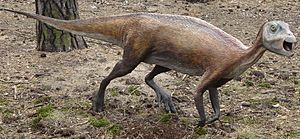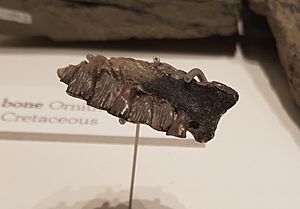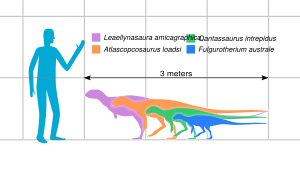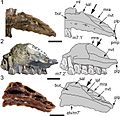Atlascopcosaurus facts for kids
Quick facts for kids Atlascopcosaurus |
|
|---|---|
 |
|
| Atlascopcosaurus loadsi model | |
| Scientific classification |
|
| Kingdom: | Animalia |
| Phylum: | Chordata |
| Clade: | Dinosauria |
| Order: | †Ornithischia |
| Suborder: | †Ornithopoda |
| Genus: | †Atlascopcosaurus Rich & Vickers-Rich 1989 |
| Species: |
†A. loadsi
|
| Binomial name | |
| †Atlascopcosaurus loadsi Rich & Vickers-Rich 1989
|
|
| Script error: The function "autoWithCaption" does not exist. | |
Script error: No such module "Check for conflicting parameters".
Atlascopcosaurus (meaning "Atlas Copco lizard") is a type of dinosaur that ate plants. It lived in what is now Australia during the Early Cretaceous period. This was about 118 to 110 million years ago.
Contents
Discovering Atlascopcosaurus
The first fossil of Atlascopcosaurus was found in 1984. It was discovered at a place called Dinosaur Cove in Victoria, Australia. This area has rocks from the Early Cretaceous period.
The main fossil found, called the holotype, is part of an upper jaw with teeth. Other pieces, like more teeth and jawbones, were also found. Scientists believe Atlascopcosaurus was a small dinosaur. It walked on two legs and ate plants.
What Atlascopcosaurus Looked Like
Even though we don't have a full skeleton, scientists can guess its size. They do this by looking at similar dinosaurs. Atlascopcosaurus was likely about two to three meters (6.5–10 feet) long. It probably weighed around 125 kilograms (275 pounds).
Naming the Dinosaur
The dinosaur was officially named Atlascopcosaurus loadsi in 1989. It was named by two scientists, Tom Rich and Patricia Vickers-Rich.
The name Atlascopcosaurus comes from the company Atlas Copco. This company provided special equipment for the dig where the dinosaur was found. Their help allowed scientists to dig out many fossils. The second part of the name, loadsi, honors William Loads. He was a manager at Atlas Copco and helped a lot with the dig.
Where Atlascopcosaurus Fits in the Dinosaur Family Tree
Scientists first thought Atlascopcosaurus belonged to a group called Hypsilophodontidae. But later studies showed it was a more basic member of the Ornithopoda group. Ornithopods are a large group of plant-eating dinosaurs. They include famous dinosaurs like Iguanodon and Hadrosaurus.
Some scientists have called Atlascopcosaurus a nomen dubium. This means "doubtful name." They felt the fossils were not unique enough to be sure it was a new species. However, other scientists still consider it a valid type of dinosaur. They place it early in the Iguanodontia group. This group includes Anabisetia, Gasparinisaura, and Qantassaurus.
Images for kids
See also
 In Spanish: Atlascopcosaurus loadsi para niños
In Spanish: Atlascopcosaurus loadsi para niños
 | Stephanie Wilson |
 | Charles Bolden |
 | Ronald McNair |
 | Frederick D. Gregory |




